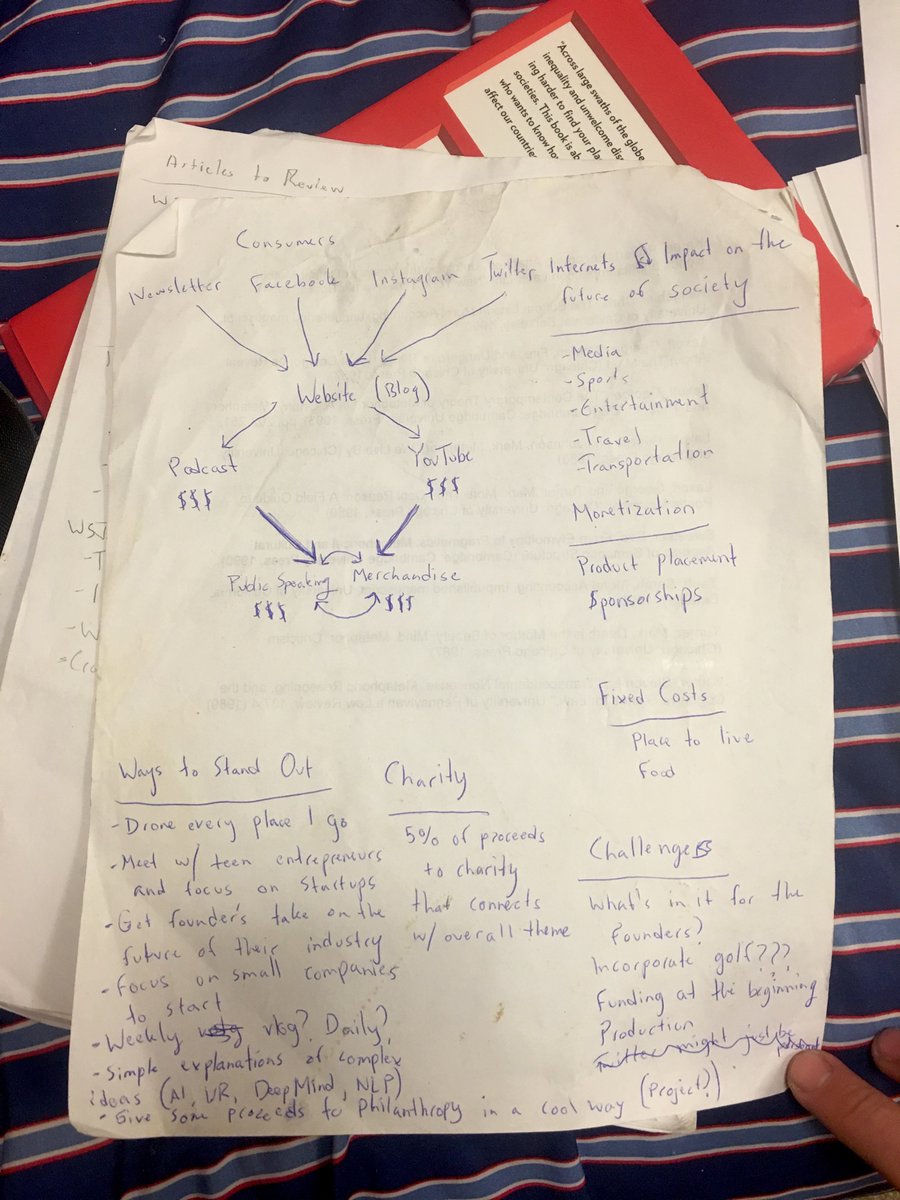
~ My Business Model ~
I write, tweet, podcast, teach, and invest. Here's how my media engine fits together.
Solid lines = The current flywheel
Dotted lines = The future flywheel
For an explanation of every element and my vision for the future, read the thread below.
I write, tweet, podcast, teach, and invest. Here's how my media engine fits together.
Solid lines = The current flywheel
Dotted lines = The future flywheel
For an explanation of every element and my vision for the future, read the thread below.

1. Twitter
The vast majority of people find me on Twitter. It's the town square of the Internet and an always-on conference where I make friends, grow my audience, and share what's on my mind.
Twitter is the top of the funnel for my professional life.
The vast majority of people find me on Twitter. It's the town square of the Internet and an always-on conference where I make friends, grow my audience, and share what's on my mind.
Twitter is the top of the funnel for my professional life.
2. Essays
Long-form writing is my favorite art form. It's the hardest thing I do, but also the most rewarding.
When I started writing, I focused on publishing as much as possible, which helped me find my voice. Now I’m focused on publishing essays that stand the test of time.
Long-form writing is my favorite art form. It's the hardest thing I do, but also the most rewarding.
When I started writing, I focused on publishing as much as possible, which helped me find my voice. Now I’m focused on publishing essays that stand the test of time.
3. Podcasts
I have two podcasts: (1) The North Star Podcast where I interview interesting people, and (2) The Write of Passage Podcast where I talk about the basics of online writing.
I have two podcasts: (1) The North Star Podcast where I interview interesting people, and (2) The Write of Passage Podcast where I talk about the basics of online writing.
4. YouTube
I publish shorts and a video essay every week. I’ve also been hosting workshops with my favorite creators like @shl, @anthilemoon, and @jackbutcher.
I use YouTube to explore my main interests: writing, education, the Western canon, creativity, and entrepreneurship.
I publish shorts and a video essay every week. I’ve also been hosting workshops with my favorite creators like @shl, @anthilemoon, and @jackbutcher.
I use YouTube to explore my main interests: writing, education, the Western canon, creativity, and entrepreneurship.
5. Email Subscribers
Email is the linchpin of my professional life. I send out two weekly newsletters: Monday Musings and Friday Finds. One is a collection of the coolest things I learned every week, and in the other, I share my favorite links.
Email is the linchpin of my professional life. I send out two weekly newsletters: Monday Musings and Friday Finds. One is a collection of the coolest things I learned every week, and in the other, I share my favorite links.
6. Writing School
Write of Passage, my 5-week online course, is my main revenue stream. More than 1,000 people have now graduated from the program, and we just launched our first spin-off course: The Writing Studio.
Ultimately, we are going to turn it into a business school.
Write of Passage, my 5-week online course, is my main revenue stream. More than 1,000 people have now graduated from the program, and we just launched our first spin-off course: The Writing Studio.
Ultimately, we are going to turn it into a business school.
7. Angel Investing
I invest in companies that help people become Citizens of the Internet. Most of the ones I’ve invested in are focused on productivity, education, and the creator economy — the three areas where I can help founders the most.
I invest in companies that help people become Citizens of the Internet. Most of the ones I’ve invested in are focused on productivity, education, and the creator economy — the three areas where I can help founders the most.
https://mobile.twitter.com/david_perell/status/1236821744826138624
8. Book
These next two are about the future.
I'm thinking about my first book, which will probably be about writing online and becoming a citizen of the Internet. I'm already in talks with agents, editors, traditional publishers and non-traditional ones.
These next two are about the future.
I'm thinking about my first book, which will probably be about writing online and becoming a citizen of the Internet. I'm already in talks with agents, editors, traditional publishers and non-traditional ones.
9. The Vision
Ultimately, I want to build a collection of Audience-First Products.
They'll be software-based and focused on writing, business, and education. All of them will be under the Write of Passage umbrella. Beyond that, time will tell!
perell.com/essay/audience…
Ultimately, I want to build a collection of Audience-First Products.
They'll be software-based and focused on writing, business, and education. All of them will be under the Write of Passage umbrella. Beyond that, time will tell!
perell.com/essay/audience…
I plan to re-write this thread every couple of years to document how things are changing.
My vision is increasingly centered around online writing. I didn’t realize how big the market was when I started and I love teaching Write of Passage.
My vision is increasingly centered around online writing. I didn’t realize how big the market was when I started and I love teaching Write of Passage.
https://twitter.com/david_perell/status/1264712805174870016?s=20
• • •
Missing some Tweet in this thread? You can try to
force a refresh





